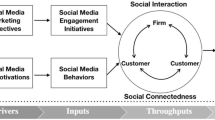Abstract
Social enterprises use a variety of tools to communicate with the public. These tools include, in particular, enterprise websites, online stores integrated into these websites and social media profiles. Nowadays, especially social media is an important corporate communication platform. Because all these tools work with personal data, social enterprises must take into account the new European Union regulation. General Data Protection Regulation – a legal framework of the personal data protection in the European Union is a widely discussed topic at the moment. The aim of this paper is to research the frequency of the communication tools used by social enterprises in the Czech Republic and the influence of General Data Protection Regulation on these instruments. To achieve this aim, two research questions are identified. What is the frequency and combination of using enterprise websites, online stores and social media profiles as main marketing, business and communication tools among Social Enterprises in the Czech Republic. What is the influence of General Data Protection Regulation on these tools in terms of social enterprises?
Similar content being viewed by others
References
Regulation(EU) 2016/679 of the European Parliament and of the Council of 27 April 2016 on the protection of natural persons with regard to the processing of personal data and on the free movement of such data, and repealing Directive 95/46/EC (General Data Protection Regulation)
Custers B, Duchesne F, Sears AM, Tani T, Hof S (2017) A Comparison of data protection legislation and policies across the EU. Comput Law Secur Rev. https://doi.org/10.1016/j.clsr.2017.09.001
TESSEA (2014) Definice a principy sociálního podniku. (Definitions and Principles of Social Enterprise). Available from: http://www.tessea.cz/tessea-o-nas/definice-a-principy-socialniho-podnikani
Ministry of Labour and Social Affairs in the Czech Republic. (n.d.). Indikátory. (Indicators). Available from: https://www.ceske-socialni-podnikani.cz/socialni-podnikani/indikatory
Mitrou L (2017) The general data protection regulation: a law for the digital age? EU Internet Law, pp 19-57
Koops BJ (2014) The trouble with European data protection law. Int Data Priv Law 4(4):250–261
Townend J (2017) Data protection and the right to be forgotten in practice: a UK perspective. Int J Leg Inf 45(1):28–33
Smith BR, Knapp J, Barr TF, Stevens CE, Cannatelli BL Social enterprises and the timing of conception: organizational identity tension, management, and marketing. J Nonprofit Public Sect Mark 22(2):108–134
Shaw E (2004) Marketing in the social enterprise context: is it entrepreneurial? Qual Mark Res Int J 7(3):194–205
Gurau C (2008) Integrated online marketing communication: implementation and management. J Commun Manag 12(2):169–184
The Office for Personal Data Protection (2019) Rok od posílení ochrany osobních údajů (A Year Since the Strengthening of Data Protection). Available from: https://www.uoou.cz/vismo/dokumenty2.asp?id_org=200144&id=34227
Gilmore A, Gallagher D, Henry S (2007) E-marketing and SMEs: operational lessons for the future. Eur Bus Rev 19(3):234–247
Erdoğmuş IE, Çiçek M (2012) The impact of social media marketing on brand loyalty. Soc Behav Sci 58:1353–1360
Morrison M, Bell J, George C, Harmon S, Munsie M, Kaye J (2017) The european general data protection regulation: challenges and considerations for iPSC researches and BIOBANKS. Regen Med 12(6):693–703
Neti S (2011) Social media & its role in marketing. Int J Enterp Comput Bus Syst 1(2):11–15
Mallin ML, Finkle TA (2007) Social entrepreneurship and direct marketing. Direct Mark Int J 1(2):68–77
Rumbold JM, Pierscionek B (2017) The effect of the general data protection regulation on medical research. J Med Internet Res 19(2):e47
Vinerean S, Cetina I, Dumitrescu L, Tichindelean M (2013) The effects of social media marketing on online consumer behavior. Int J Bus Manag 8(14):66–79
Madill J, Ziegler R (2012) Marketing social missions—adopting social marketing for social entrepreneurship? A conceptual analysis and case study. Int J Nonprofit Volunt Sect Mark 17(4):341–351
KPMG (2019) GDPR slaví rok, problémy s ním má třetina českých společností (GDPR Celebrates a Year, a Third of Czech Companies Having Problems with it). Available from: https://home.kpmg/cz/cs/home/pro-media/tiskove-zpravy/2019/05/gdpr-slavi-rok-problemy-s-nim-ma-tretina-ceskych-spolecnosti.html
Smejkal V (2017) Dynamický biometrický podpis a nařízení GDPR. (Dynamic Biometric Signature and GDPR). Rev pro právo Technol 16:89–112
Association of Small and Medium Enterprises and Tradesmen of the Czech Republic (2017) 51. Průzkum AMSP a KB – GDPR zasáhne dvě třetiny podnikatelů (The Survey of AMSP and KB – GDPR Will Influence Two Thirds of Entrepreneurs. Available from: http://amsp.cz/51-pruzkum-amsp-cr-a-kb-gdpr-zasahne-dve-tretiny-podnikatelu/
European Commission (2003) Commission Recommendation of 6 May 2003 Concerning the Definition of Micro, Small and Medium-sized Enterprises. Available from: http://eur-lex.europa.eu/legal-content/EN/TXT/?uri=CELEX:32003H0361
Mangold WG, Faulds DJ (2009) Social Media: The New Hybrid Element of the Promotion Mix. Bus Horiz 52(4):357–365
Palmer A, Lewis NK (2013) An experiential, social network-based approach to direct marketing. Direct Mark Int J 3(3):162–176
Tankard C (2016) What the GDPR means for businesses. Netw Secur 6:5–8
Wachter S, Mittelstadt B, Floridi L (2017) Why a right to explanation of automated decision-making does not exist in the general data protection regulation. Int Data Priv Law 7(2):76–99
Zietlow JT (2001) Social entrepreneurship: managerial, finance and marketing aspects. J Nonprofit Public Sect Mark 9:19–43
Author information
Authors and Affiliations
Corresponding author
Additional information
Publisher’s note
Springer Nature remains neutral with regard to jurisdictional claims in published maps and institutional affiliations.
Grant Affiliation
IGA_FF_2019_002_Shifts in Entrepreneurial Approaches in the Contemporary Economy
Rights and permissions
About this article
Cite this article
Kročil, O., Pospíšil, R. The Influence of GDPR on Activities of Social Enterprises. Mobile Netw Appl 25, 860–867 (2020). https://doi.org/10.1007/s11036-020-01513-7
Published:
Issue Date:
DOI: https://doi.org/10.1007/s11036-020-01513-7




